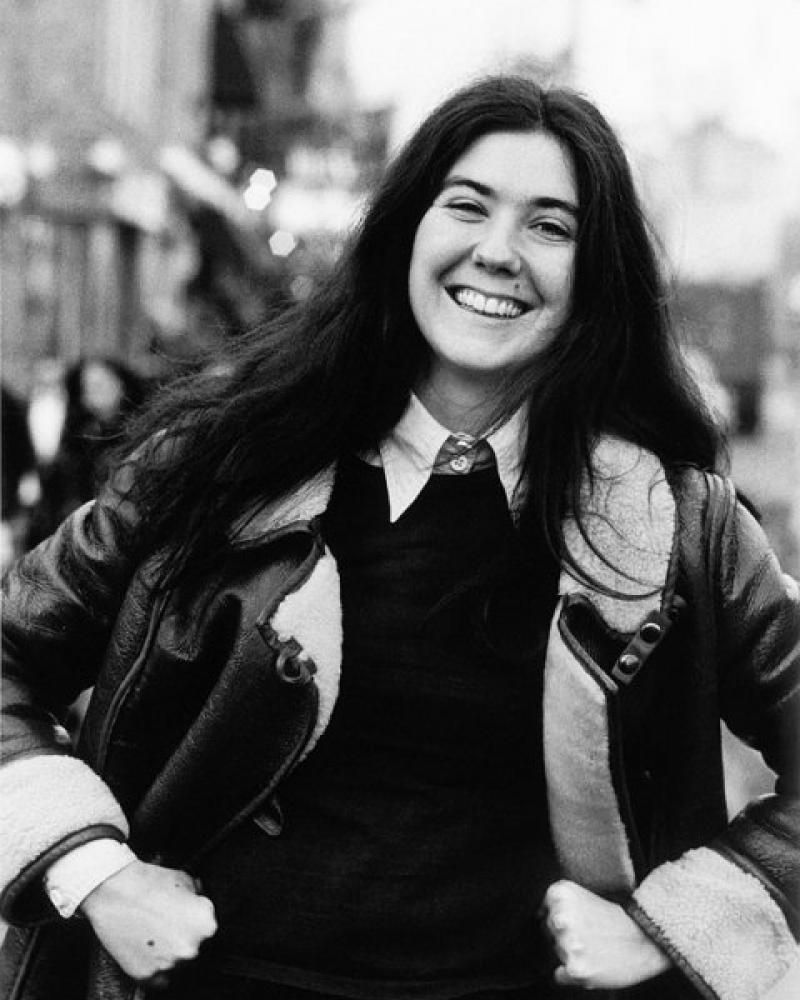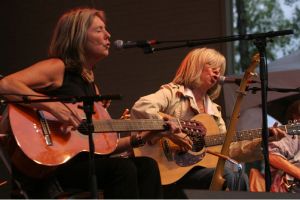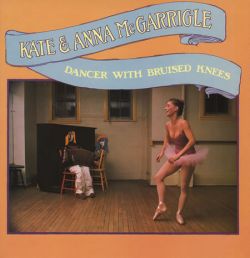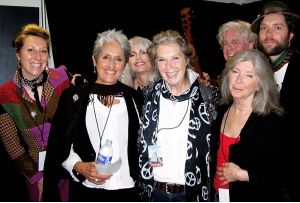Kate McGarrigle, 1946-2010 | reviews, news & interviews
Kate McGarrigle, 1946-2010
Kate McGarrigle, 1946-2010
The Canadian matriarch of folk music remembered

I’m no folky but I fell for the songs of Kate and Anna McGarrigle the moment I first heard their album Dancer with Bruised Knees, and it’s remained a companion ever since. It never struck me that their songs and the eclectic backing music was "folk", as it was often categorised; the tag presumably arose from Kate’s accordion and banjo playing, their acoustic guitars and, of course, the French-Canadian chansons they sang at home as children - and thankfully introduced to the rest of us.
 But regardless of definitions, when Kate sat at the piano and Anna played guitar, or they swapped places and instruments, as far as I was concerned, they were simply fine musicians with strong, distinctive voices, and their songs were personal, quirky, poignant and poetic. Kate’s high, sharp pitches were matched by her unpredictable capacity to burst into shrill open-mouthed laughter onstage and set off Anna and the whole band, and the audience with it. Her quick, droll humour was evident in their between-songs banter, which presumably started when they were children. But singing was a serious business, and rising together, their voices created exquisite, unusual harmonies possible because of those long, close, intuitive connections. Floating above the room, they wove translucent sculptural shapes which swelled into richer, more substantial forms or separated off on different currents before coming together again. It’s unbearably sad to imagine the remaining voice singing alone.
But regardless of definitions, when Kate sat at the piano and Anna played guitar, or they swapped places and instruments, as far as I was concerned, they were simply fine musicians with strong, distinctive voices, and their songs were personal, quirky, poignant and poetic. Kate’s high, sharp pitches were matched by her unpredictable capacity to burst into shrill open-mouthed laughter onstage and set off Anna and the whole band, and the audience with it. Her quick, droll humour was evident in their between-songs banter, which presumably started when they were children. But singing was a serious business, and rising together, their voices created exquisite, unusual harmonies possible because of those long, close, intuitive connections. Floating above the room, they wove translucent sculptural shapes which swelled into richer, more substantial forms or separated off on different currents before coming together again. It’s unbearably sad to imagine the remaining voice singing alone.
 I played Dancer with Bruised Knees over and over, partly for the lyrics which I always assumed had autobiographical undercurrents, but also because of how its songs linked to my own experiences. The title track depicts a dancer feeling safe that her partner would always catch her - until he let her down. Hence the bruised knees. We’ve all been there, and that includes Kate’s experience with her former husband, Loudon Wainwright III. "First Born" - about her son Rufus, surely? - tells of a mother’s silver-spoon treatment of her boy. Its universal appeal is one of the key attractions of her songs. I still find "I Eat Dinner" an almost unbearable description of a solitary life and of eating alone. When she sings “I eat leftovers with mashed potato” she’s almost mocking the curious habits lone diners develop, and with “No more candle-light, romance, small talk… I never thought it would end up this way,” she conjures a bereaved or divorced eater (herself after the Wainwright separation?) - and that single place-setting. Even if you’re locked in coupledom, there’s always a widowed mother or divorced friend waiting to appear before you as you listen.
I played Dancer with Bruised Knees over and over, partly for the lyrics which I always assumed had autobiographical undercurrents, but also because of how its songs linked to my own experiences. The title track depicts a dancer feeling safe that her partner would always catch her - until he let her down. Hence the bruised knees. We’ve all been there, and that includes Kate’s experience with her former husband, Loudon Wainwright III. "First Born" - about her son Rufus, surely? - tells of a mother’s silver-spoon treatment of her boy. Its universal appeal is one of the key attractions of her songs. I still find "I Eat Dinner" an almost unbearable description of a solitary life and of eating alone. When she sings “I eat leftovers with mashed potato” she’s almost mocking the curious habits lone diners develop, and with “No more candle-light, romance, small talk… I never thought it would end up this way,” she conjures a bereaved or divorced eater (herself after the Wainwright separation?) - and that single place-setting. Even if you’re locked in coupledom, there’s always a widowed mother or divorced friend waiting to appear before you as you listen.
The McGarrigles’ audiences always had a strong female presence. Over the years, I felt that their lives, as sung about, moved and changed in parallel with my own, and judging by the cheers and laughter, they certainly chimed with many in their audiences. At first, their appeal for me was partly seeing two women playing instruments, singing mostly their own songs, and running the show - up there and in control. Their interactions were fascinating and unusual: confidently letting private jokes catch in the microphone as they tuned up, little asides about how they looked, and in later years, mocking themselves lightly for their new glam look, the sparkly scarves and glinting ear-rings and that once taboo accessory for us feminists, lipstick. It was a way of unselfconsciously and effortlessly drawing us into the close web they created between themselves; that’s how they transformed every concert hall into a family living room much like the one at home where they sang with their parents as kids, and Kate repeated with her own.
 My favourite McGarrigle memory is the concert at the Royal Festival Hall in London, where Kate introduced Martha for the first time (pictured, from left: Martha Wainwright, Joan Baez, Emmylou Harris, Kate McGarrigle, Bruce Cockburn, Anna McGarrigle and Rufus Wainwright). The awkward teenager in a mini-dress shifted around on long skinny legs like a nervous colt, kept moving around her mum for reassurance, and then when she sang, bending and writhing her legs – as she still does in her marvellous performances with her own band – she let go of a voice so mature, it was ready for the world. Her mother listened with eyes shut then she joined her, making their own, quite different harmonies from those with Anna.
My favourite McGarrigle memory is the concert at the Royal Festival Hall in London, where Kate introduced Martha for the first time (pictured, from left: Martha Wainwright, Joan Baez, Emmylou Harris, Kate McGarrigle, Bruce Cockburn, Anna McGarrigle and Rufus Wainwright). The awkward teenager in a mini-dress shifted around on long skinny legs like a nervous colt, kept moving around her mum for reassurance, and then when she sang, bending and writhing her legs – as she still does in her marvellous performances with her own band – she let go of a voice so mature, it was ready for the world. Her mother listened with eyes shut then she joined her, making their own, quite different harmonies from those with Anna.
Kate McGarrrigle died of sarcoma, a type of cancer, on 18 January, at her home in Montreal. She was 63. Anna sent an email message out to the world that "she departed in a haze of song and love surrounded by family and good friends". They were packed into her room, singing to her as she slowly passed through onto that mysterious journey. Her departure, of course, leaves a terrible space in the songs which Anna will have to reconstitute, but with Martha’s new baby and her own and Rufus’s voices assured and loved, Kate died knowing that the void would be filled in a different, bright and certainly a McGarrigle way.
Official website of the McGarrigles.
Overleaf: watch a clip from a documentary about the McGarrigles
I’m no folky but I fell for the songs of Kate and Anna McGarrigle the moment I first heard their album Dancer with Bruised Knees, and it’s remained a companion ever since. It never struck me that their songs and the eclectic backing music was "folk", as it was often categorised; the tag presumably arose from Kate’s accordion and banjo playing, their acoustic guitars and, of course, the French-Canadian chansons they sang at home as children - and thankfully introduced to the rest of us.
 But regardless of definitions, when Kate sat at the piano and Anna played guitar, or they swapped places and instruments, as far as I was concerned, they were simply fine musicians with strong, distinctive voices, and their songs were personal, quirky, poignant and poetic. Kate’s high, sharp pitches were matched by her unpredictable capacity to burst into shrill open-mouthed laughter onstage and set off Anna and the whole band, and the audience with it. Her quick, droll humour was evident in their between-songs banter, which presumably started when they were children. But singing was a serious business, and rising together, their voices created exquisite, unusual harmonies possible because of those long, close, intuitive connections. Floating above the room, they wove translucent sculptural shapes which swelled into richer, more substantial forms or separated off on different currents before coming together again. It’s unbearably sad to imagine the remaining voice singing alone.
But regardless of definitions, when Kate sat at the piano and Anna played guitar, or they swapped places and instruments, as far as I was concerned, they were simply fine musicians with strong, distinctive voices, and their songs were personal, quirky, poignant and poetic. Kate’s high, sharp pitches were matched by her unpredictable capacity to burst into shrill open-mouthed laughter onstage and set off Anna and the whole band, and the audience with it. Her quick, droll humour was evident in their between-songs banter, which presumably started when they were children. But singing was a serious business, and rising together, their voices created exquisite, unusual harmonies possible because of those long, close, intuitive connections. Floating above the room, they wove translucent sculptural shapes which swelled into richer, more substantial forms or separated off on different currents before coming together again. It’s unbearably sad to imagine the remaining voice singing alone.
 I played Dancer with Bruised Knees over and over, partly for the lyrics which I always assumed had autobiographical undercurrents, but also because of how its songs linked to my own experiences. The title track depicts a dancer feeling safe that her partner would always catch her - until he let her down. Hence the bruised knees. We’ve all been there, and that includes Kate’s experience with her former husband, Loudon Wainwright III. "First Born" - about her son Rufus, surely? - tells of a mother’s silver-spoon treatment of her boy. Its universal appeal is one of the key attractions of her songs. I still find "I Eat Dinner" an almost unbearable description of a solitary life and of eating alone. When she sings “I eat leftovers with mashed potato” she’s almost mocking the curious habits lone diners develop, and with “No more candle-light, romance, small talk… I never thought it would end up this way,” she conjures a bereaved or divorced eater (herself after the Wainwright separation?) - and that single place-setting. Even if you’re locked in coupledom, there’s always a widowed mother or divorced friend waiting to appear before you as you listen.
I played Dancer with Bruised Knees over and over, partly for the lyrics which I always assumed had autobiographical undercurrents, but also because of how its songs linked to my own experiences. The title track depicts a dancer feeling safe that her partner would always catch her - until he let her down. Hence the bruised knees. We’ve all been there, and that includes Kate’s experience with her former husband, Loudon Wainwright III. "First Born" - about her son Rufus, surely? - tells of a mother’s silver-spoon treatment of her boy. Its universal appeal is one of the key attractions of her songs. I still find "I Eat Dinner" an almost unbearable description of a solitary life and of eating alone. When she sings “I eat leftovers with mashed potato” she’s almost mocking the curious habits lone diners develop, and with “No more candle-light, romance, small talk… I never thought it would end up this way,” she conjures a bereaved or divorced eater (herself after the Wainwright separation?) - and that single place-setting. Even if you’re locked in coupledom, there’s always a widowed mother or divorced friend waiting to appear before you as you listen.
The McGarrigles’ audiences always had a strong female presence. Over the years, I felt that their lives, as sung about, moved and changed in parallel with my own, and judging by the cheers and laughter, they certainly chimed with many in their audiences. At first, their appeal for me was partly seeing two women playing instruments, singing mostly their own songs, and running the show - up there and in control. Their interactions were fascinating and unusual: confidently letting private jokes catch in the microphone as they tuned up, little asides about how they looked, and in later years, mocking themselves lightly for their new glam look, the sparkly scarves and glinting ear-rings and that once taboo accessory for us feminists, lipstick. It was a way of unselfconsciously and effortlessly drawing us into the close web they created between themselves; that’s how they transformed every concert hall into a family living room much like the one at home where they sang with their parents as kids, and Kate repeated with her own.
 My favourite McGarrigle memory is the concert at the Royal Festival Hall in London, where Kate introduced Martha for the first time (pictured, from left: Martha Wainwright, Joan Baez, Emmylou Harris, Kate McGarrigle, Bruce Cockburn, Anna McGarrigle and Rufus Wainwright). The awkward teenager in a mini-dress shifted around on long skinny legs like a nervous colt, kept moving around her mum for reassurance, and then when she sang, bending and writhing her legs – as she still does in her marvellous performances with her own band – she let go of a voice so mature, it was ready for the world. Her mother listened with eyes shut then she joined her, making their own, quite different harmonies from those with Anna.
My favourite McGarrigle memory is the concert at the Royal Festival Hall in London, where Kate introduced Martha for the first time (pictured, from left: Martha Wainwright, Joan Baez, Emmylou Harris, Kate McGarrigle, Bruce Cockburn, Anna McGarrigle and Rufus Wainwright). The awkward teenager in a mini-dress shifted around on long skinny legs like a nervous colt, kept moving around her mum for reassurance, and then when she sang, bending and writhing her legs – as she still does in her marvellous performances with her own band – she let go of a voice so mature, it was ready for the world. Her mother listened with eyes shut then she joined her, making their own, quite different harmonies from those with Anna.
Kate McGarrrigle died of sarcoma, a type of cancer, on 18 January, at her home in Montreal. She was 63. Anna sent an email message out to the world that "she departed in a haze of song and love surrounded by family and good friends". They were packed into her room, singing to her as she slowly passed through onto that mysterious journey. Her departure, of course, leaves a terrible space in the songs which Anna will have to reconstitute, but with Martha’s new baby and her own and Rufus’s voices assured and loved, Kate died knowing that the void would be filled in a different, bright and certainly a McGarrigle way.
Official website of the McGarrigles.
Overleaf: watch a clip from a documentary about the McGarrigles
The future of Arts Journalism
You can stop theartsdesk.com closing!
We urgently need financing to survive. Our fundraising drive has thus far raised £49,000 but we need to reach £100,000 or we will be forced to close. Please contribute here: https://gofund.me/c3f6033d
And if you can forward this information to anyone who might assist, we’d be grateful.

Subscribe to theartsdesk.com
Thank you for continuing to read our work on theartsdesk.com. For unlimited access to every article in its entirety, including our archive of more than 15,000 pieces, we're asking for £5 per month or £40 per year. We feel it's a very good deal, and hope you do too.
To take a subscription now simply click here.
And if you're looking for that extra gift for a friend or family member, why not treat them to a theartsdesk.com gift subscription?
more New music
 Solar Eyes, Hare & Hounds, Birmingham review - local lads lay down some new tunes for a home crowd
Psychedelic indie dance music marinated in swirling dry ice
Solar Eyes, Hare & Hounds, Birmingham review - local lads lay down some new tunes for a home crowd
Psychedelic indie dance music marinated in swirling dry ice
 The Lemonheads' 'Love Chant' is a fine return to form
Evan Dando finally gets back in the saddle with an album of new tunes
The Lemonheads' 'Love Chant' is a fine return to form
Evan Dando finally gets back in the saddle with an album of new tunes
 Music Reissues Weekly: Evie Sands - I Can’t Let Go
Diligent, treasure-packed tribute to one of Sixties’ America’s great vocal stylists
Music Reissues Weekly: Evie Sands - I Can’t Let Go
Diligent, treasure-packed tribute to one of Sixties’ America’s great vocal stylists
 'Deadbeat': Tame Impala's downbeat rave-inspired latest
Fifth album from Australian project grooves but falls flat
'Deadbeat': Tame Impala's downbeat rave-inspired latest
Fifth album from Australian project grooves but falls flat
 Heartbreak and soaring beauty on Chrissie Hynde & Pals' Duets Special
The great Pretender at her most romantic and on the form of her life
Heartbreak and soaring beauty on Chrissie Hynde & Pals' Duets Special
The great Pretender at her most romantic and on the form of her life
 The Last Dinner Party's 'From the Pyre' is as enjoyable as it is over-the-top
Musically sophisticated five-piece ramp up the excesses but remain contagiously pop
The Last Dinner Party's 'From the Pyre' is as enjoyable as it is over-the-top
Musically sophisticated five-piece ramp up the excesses but remain contagiously pop
 Moroccan Gnawa comes to Manhattan with 'Saha Gnawa'
Trance and tradition meet Afrofuturism in Manhattan
Moroccan Gnawa comes to Manhattan with 'Saha Gnawa'
Trance and tradition meet Afrofuturism in Manhattan
 Soulwax’s 'All Systems Are Lying' lays down some tasty yet gritty electro-pop
Belgian dancefloor veterans return to the fray with a dark, pop-orientated sound
Soulwax’s 'All Systems Are Lying' lays down some tasty yet gritty electro-pop
Belgian dancefloor veterans return to the fray with a dark, pop-orientated sound
 Music Reissues Weekly: Marc and the Mambas - Three Black Nights Of Little Black Bites
When Marc Almond took time out from Soft Cell
Music Reissues Weekly: Marc and the Mambas - Three Black Nights Of Little Black Bites
When Marc Almond took time out from Soft Cell
 Album: Mobb Deep - Infinite
A solid tribute to a legendary history
Album: Mobb Deep - Infinite
A solid tribute to a legendary history
 Album: Boz Scaggs - Detour
Smooth and soulful standards from an old pro
Album: Boz Scaggs - Detour
Smooth and soulful standards from an old pro
 Emily A. Sprague realises a Japanese dream on 'Cloud Time'
A set of live improvisations that drift in and out of real beauty
Emily A. Sprague realises a Japanese dream on 'Cloud Time'
A set of live improvisations that drift in and out of real beauty

Add comment